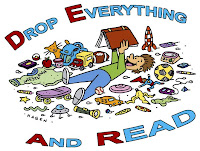





A colleague of mine once stated that reading for pleasure has been replaced by test preparation, and she’s lucky to squeeze in 8-10 minutes a day for independent reading. This is a pathetic example of over test prepping to the maximum. I don’t blame the teacher in the least. I do blame the system that puts state and federal testing in front of the real learning that can happen with well-organized independent reading. I tend to get in a tizzy when I hear crazy things like this. How in the world do the people in charge think this can be best practice? I know the same scenario plays out in districts across the country.
If you want children to become better readers you must:
- Provide students time to read
- Give them a variety of reading materials from which to choose
- Don’t overlook the magic of comic books, manga, and graphic novels. Such material can be gateways into stronger literature
- Model reading. Have Drop Everything and Read (D.E.A.R.) time every day… this includes the teacher
- Most importantly, inspire a love of reading. Teachers can do this by blessing the book.
Blessing the Book I can’t help it; every time I read the phrase (BLESS THE BOOKS) I have flashbacks to Catholic school. Bless the Books conjures images of the Pope decked out in his fine silk vestments, his miter planted firmly on his head. papal Pastoral Staff in one hand, and a copy of Captain Underpants and the Wrath of the Wicked Wedgie Woman in the other. The Pope speaks, and all that have ears to hear shall listen. “I give my blessing to Captain Underpants and the Wrath of the Wicked Wedgie Woman. It’s a fun read and I especially like the "Flip-O-Rama", Okay, it probably wouldn’t happen, but if a teacher makes a big deal out of a book, or a series of books, a kid will run to be first in line to get a copy.
Teachers-at least in the elementary grades-really do have a great amount of influential authority; their students do not overlook what they say and do. It’s a simple process that works quite well. A problem occurs when you talk up a book, and there aren’t many copies available. Make sure there are plenty of titles; either in your room or in the media center.
Even though Blessing the Books, gives me psychotropic vacations, I still think it is one of the best ways to promote interest in reading a book. It reminds me of a quote from Canadian writer Laurence J. Peter. “Television has changed the American child from an irresistible force to an immovable object” (Peter, 2000). We have big competition for the hearts and minds of students. We need to sell the book, sell reading, sell literacy; we need to make it relevant. Let’s face it; we’re in competition with many diversions, which includes Nintendo Wii , Smart Phones, Twitter, Facebook, Youtube. It's easy to see why kids will choose an electronic outlet instead of reading. We have lots of work to do.
Reference
Peter, L. (2000). Retrieved December 22, 2008 from http://www.brainyquote.com/quotes/authors/l/laurence_j_peter_2.html















